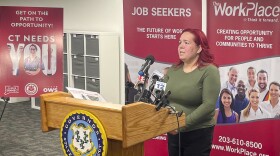http://cptv.vo.llnwd.net/o2/ypmwebcontent/Chion/hj%20110211%20sb%20prestige%20feature.mp3
Manufacturing used to be a mainstay of employment in Connecticut. Competition from lower-cost states and overseas production has decimated the industry. But small manufacturers persist in the state and are finding ways to survive. WNPR’s Harriet Jones visited one shop in Milford for our latest small business profile.
This is Prestige Tool Manufacturing, a small job shop that makes custom parts for everything from helicopters to news cameras to pressure gauges. The founder of Prestige, Ken Dugan learned his trade at GE, Schick and other big plants, before striking out on his own in the early 1980s
"I borrowed some money from my father-in-law, I started the business in a little 200 square foot garage in our other house we had in Shelton at the time, and 27 years, I’m still doing it."
Now Dugan employs seven people making small production runs of parts for a wide variety of larger manufacturers. Todd Tobin trained as a tool and dye technician in Michigan and worked in the auto industry there. With the collapse of that industry in the recession, he moved back to his home state of Connecticut.
"I like smaller shops just because you don’t get lost in numbers. The work seems to be different either every day or every week. Larger shops that do larger volume you do the same thing every day.”
Prestige stresses workforce development. Ken Dugan says sometimes it’s hard to find workers who have the all-round skills he needs in a small shop. So often, he trains his own. Justin Hendricks began working here in 2007, just as he graduated from technical high school. He became an apprentice at Prestige.
“There’s not a lot of shops out there that still participate in that program. About last year I finished my apprenticeship program and got a decent raise because of it. And I can go anywhere—not that I’m going to leave or anything—but I could take that card and go anywhere I want, and I’m worth a little more money because of the apprenticeship program that Ken participates in.”
When Dugan steps away from the shop floor he must deal with the other aspects of running his business, which include controlling his costs. Dugan provides healthcare and paid sick leave for his employees, but he’s dead against state mandates on benefits.
“If the state would just back off on this paid sick leave, it would give you an indication that they are becoming a business friendly state. You can’t dictate what kind of benefits every business in the state gives—it’s just none of their business.”
Labor and energy costs are high in the state, and Dugan complains that state government just doesn’t understand the equation when it comes to economic recovery.
"Instead of raising taxes on the businesses, if the business is allowed to prosper, and you’re allowed to hire people when you need them, the workers are going to create the tax revenue that they need—not the businesses.”
Competition from overseas has wiped out many smaller manufacturers in the state who simply cannot compete on price with Chinese imports. But Dugan says there are issues with production that’s been offshored.
“There were several items I can think of that maybe we did the prototyping on it, or we ran some initial production on it, and then they just had to get it out of the country to make more money on it. It’s happened many times before from various customers, we’ve gotten work back that they had manufactured in China, and it was just total junk—and they send it to us to repair. Doesn’t make sense to me.”
Machinist Todd Tobin has lived through the effects of the collapse of one American industry in Michigan, but despite that he says he believes manufacturing will always have a future in Connecticut.
“There’s things that we have to make here that we can’t send somewhere else. There’s always going to be machinery and equipment that are used here that are going to need to be fixed. Some of the more high volume stuff might be cheaper to do overseas or what not, but I think skilled machining is still going to be around—at least I’m hoping.”
For WNPR, I'm Harriet Jones








